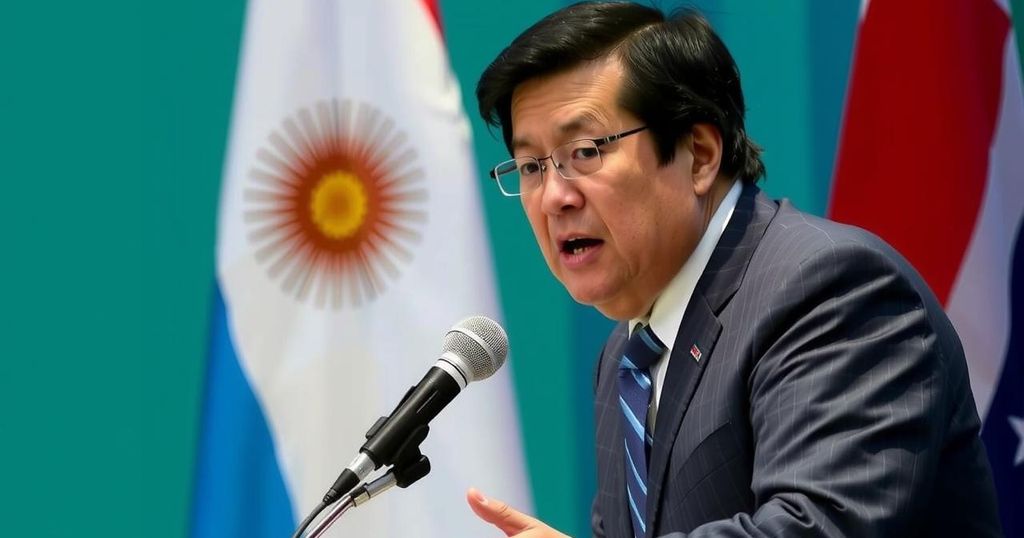Argentina’s President Javier Milei removed Foreign Minister Diana Mondino following the country’s support for a U.N. resolution to end the U.S. embargo on Cuba. The decision underscores a shift toward pro-American and pro-Israeli foreign policy since Milei took office in December 2023. Mondino’s tenure faced controversies, prompting an internal audit of the Foreign Relations Ministry after her dismissal.
On Wednesday, Argentine President Javier Milei dismissed Foreign Minister Diana Mondino shortly after Argentina voted in favor of a United Nations resolution urging the lifting of the U.S. economic embargo on Cuba. Following this unexpected decision, Gerardo Werthein, who previously served as Argentina’s ambassador to the United States, was appointed as her successor. The reasons behind Mondino’s dismissal were not explicitly outlined, though it was reiterated that it was linked to the controversial vote at the U.N. General Assembly. A statement from the President’s office underscored the administration’s strong opposition to the Cuban government, affirming its commitment to a foreign policy that denounces regimes violating human rights and individual liberties. The resolution, which called for an end to the embargo, was supported by 187 countries, with only the United States and Israel voting against it. Since assuming office in December 2023, President Milei has been realigning Argentina’s foreign policy, increasingly favoring U.S. and Israeli perspectives. This shift includes vocal support for Israeli Prime Minister Benjamin Netanyahu’s administration amid ongoing military actions in Gaza, which stands in stark contrast to positions adopted by several other Latin American nations. Countries such as Bolivia and Colombia have cut diplomatic connections with Israel, while Brazil and others have recalled their ambassadors, highlighting a significant regional divide on this matter. Diana Mondino’s brief term as Foreign Minister faced its share of controversies; notably, her office recently retracted a press statement after erroneously using the term “Falklands” instead of “Malvinas,” the name recognized in Argentina for the disputed islands. Moreover, she faced criticism for comments made during a trip to China, where she suggested that “all Chinese look like the same,” further contributing to instability within the Ministry of Foreign Relations. In response to her departure, President Milei’s government announced intentions to conduct an internal audit of the Foreign Relations Ministry to identify individuals who may be promoting policies conflicting with the government’s stance on freedom and human rights. As Argentina navigates this transitional phase, the consequences of these administrative changes for its international relations remain uncertain, with Milei’s government positioned to redefine its global posture amidst a shifting geopolitical landscape.
The dismissal of Diana Mondino, Argentina’s Foreign Minister, by President Javier Milei, takes center stage following the country’s vote at the United Nations General Assembly, supporting a resolution to lift the economic embargo imposed by the United States on Cuba. The decision reflects a broader shift in Argentina’s foreign policy under Milei’s administration, which has increasingly aligned itself with U.S. and Israeli interests since he took office in December 2023. This shift is significant, particularly in the context of contemporary geopolitical tensions, and highlights the divergences among Latin American countries regarding support for Israel amid ongoing conflicts.
The dismissal of Diana Mondino by President Javier Milei illuminates shifting dynamics in Argentina’s foreign policy, especially regarding its stance on the U.S. embargo on Cuba and relations with Israel. As Milei emphasizes a diplomatic approach that prioritizes alignment with U.S. ideals, the consequences of such a shift could reverberate across Argentina’s international relations. The internal audit announced may further reshape the Ministry of Foreign Relations, as the government seeks to ensure a cohesive foreign policy direction moving forward.
Original Source: www.newsweek.com







